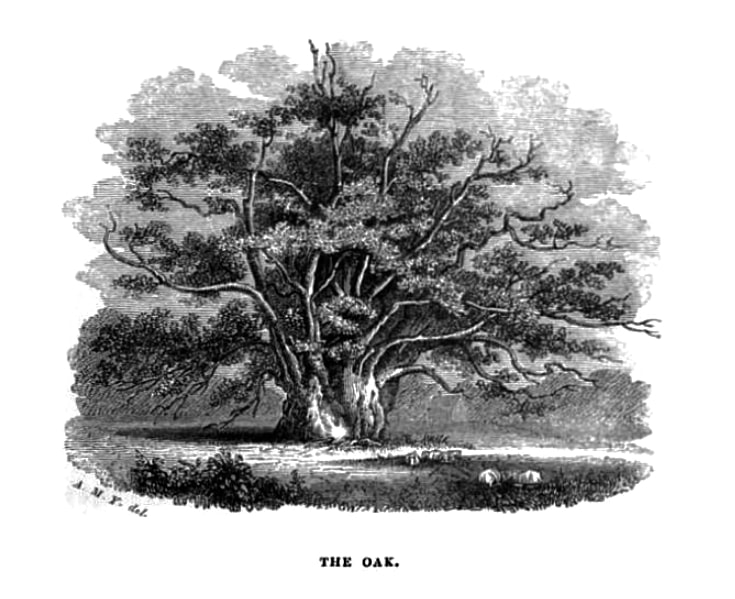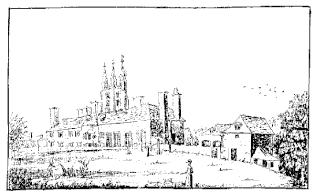philip john ducarel1778 - 1855
Born in Calcutta, he grew up in Devon. As an adult he moved to Newland where he was a landowner, businessman and magistrate. In 1836 he published his epic poem set in the Forest of Dean during the Wars of the Roses. It was full of local detail that captured the landscape of the Forest, and the spirit of its inhabitants. |
A plate from De Wyrhale.
|
EARLy life & FamilyPhilip John Ducarel was born in India in 1778 and baptised in Calcutta (on 11th June 1778). He was one of six children, four of his siblings also born in India and two in England. He had four sisters, Elizabeth (1771-1798), Mary (1777 – 1861), Jane Hamilton (1785 – 1862) and Harriet (1790 -1813) and one brother, William (1780 – 1797). Philip's ancestors were French Huguenots (Protestants), his great-grandfather being ennobled for his work with the French parliament. After he died in 1713, Philip's great-grandmother left France with her children, arriving in England as a refugee. Philip's father Gerard Gustavas was born in London in 1745. By 1758 Gustavas was a midshipman in the Royal Navy, and later he secured a position with the East India Company. He worked in various administrative roles, and as a translator to senior officials in India. At some point in the 1770s he met Philip's mother, Elizabeth (Bibi) Mirza the daughter of the Rajah of Purnia in north-eastern India. She accompanied Gerard back to England and in 1787 they were married in London before retiring to Exmouth in Devon. Philip's father died in 1800. His mother died in 1822 (and is buried in Newland churchyard, having moved to the village with her son).
|
published worksPoems (1805) Poems, Original and Translated (1807) A Paraphrase of the Psalms (1833) De Wyrhale : A Tale of Dean Forest, in five Cantos (1836) |
|
The entry recording P J Ducarel's baptism in Calcutta, India in 1778.
British India Office Ecclesiastical Returns- Births & Baptisms Transcription |
Philip married Catherine Jane Hyde Shaw in 1802 at Littleham, Exmouth. Later that year she was in Italy looking to recover her health, but in December, in Pisa, she died and was buried in Rome. Her mother, who had accompanied her, also died in Pisa in February 1803. In 1808 Philip remarried. His second wife was Lucy Crossman and they married at West Monkton, two miles north east of Taunton Somerset while living at Walford House Somerset.
|
move to the Forest
|
Newland House, 1772
British History Online, Newland |
It is unclear when why Philip came to the Forest of Dean, though, as Cyril Hart points out in his book Coleford (1983, p258), Ducarel was related by marriage to the Palmer family in Newland. What is certain is that in 1813 he bought Newland House - at the southwest corner of Newland churchyard - from Edmund Probyn, and also acquired other properties and land in the area (including the Ostrich Inn, a thriving inn still today). In 1841 Philip and his second wife Lucy were living at Newland his with his two widowed sisters Jane Bevan and Mary Simpson. Lucy died in 1846, aged 61, and is buried at Newland Church. In 1851 records show that Philip, a magistrate for Gloucester, was living at Newland house, with just his widowed sister Jane.
|
Philip Ducarel could be classed as one of the new ’Gloucestershire Gentry’, one of the newcomers who moved into Gloucestershire, acquired estates and became accepted socially. He was very active in the local community with numerous references in the local paper to his activities. To be a magistrate at the time it was necessary to own land worth £100, to have adequate means, and time available to both carry out the duties of office as well as establish acceptance into county society. As a magistrate at the time of the Forest of Dean riots in 1831 it was Ducarel who was responsible for reading the riot act. He was also on the Grand Jury for the trial held in Monmouth after the chartist Rebellion in Newport in 1839 where the leader John Frost was sentenced to deportation.
BUSINESS INTERESTS Ducarel was a Director of The Old Passage Ferry Association which was formed in 1825 to improve facilities at the old passage between Beachley and Aust and make it a more efficient and attractive crossing. The association built a stone pier or slipway 486 feet long at Beachley and two piers at Aust connected through the mud to the shore by a surface road (a copy of a share certificate signed by him as director is on display at Chepstow Museum). He laid the foundation stone at a ceremony attended by two or three hundred people from the adjacent countryside. In June 1827 the company introduced a paddle steamer, The Worcester and a second The Beaufort in 1832. The coming of the railways saw the transfer of business to the new Passage at Newnham on Severn which in turn declined with the opening of the Severn tunnel in 1886. DeathPhilip John died on 16 December 1855 and is buried in Newland Churchyard. The Hereford Journal newspaper reported his death, noting that "The deceased gentleman will be greatly missed in the neighbourhood, particularly by the poor". The Hereford Times reported on the funeral: "The remains of this lamented gentleman, who resided at Newland House near Coleford, were on this night conveyed to their last resting place in Newland Churchyard.The funeral was attended by a very large number of mourners of every class – high to low. The public loss by Mr Ducarel’s death will be deeply felt in various ways in the neighbourhood." A memorial window was installed in the church in 1862 after its major refurbishment in memory of P. J. Ducarel based on the Bible story of the Raising of Lazarus.
|
authorHis first book, a collection of poems, was published in 1805.
The dedication reads “To a beloved sister this book is dedicated by her affectionate brother”. The poems are interspersed with quotes from other poets including the Roman poets Martial, Virgil, Ovid and Lucretius, the English poet and hymnist William Cowper (1731-1833) and the Italian Poet Ariosto (1474-1833). His second book Poems, Original and Translated, was published two years later in 1807 (it contains 12 poems that had been published in his previous book). His third book, A Paraphrase of the Psalms, bears the full title:- A Paraphrase of the Psalms in Verse, with strict attention to the Notes and Commentaries of Bishops Horsley, Horne, etc and closely approximated to the Text of the Authorised Versions of the Old Testament and the Liturgy. The book was advertised at the time of publication in several newspapers, amongst them The Morning Post who stated that: “The execution deserves great praise … Much valuable information with respect to the peculiar character and meaning of the Psalms is to be found in Mr Ducarels’ preface and the extracts from preceding authors, which is interspersed through his volume.” Ducarel was President of the Forest of Dean Bible Society which suggests a deep religious faith which may have been influential in his work. |
Written and researched by Reading the Forest volunteer Teresa Davies.
Research Sources
- T. H. Bowyer, ‘Ducarel, Gerard Gustavus (1745–1800)’, Oxford Dictionary of National Biography, Oxford University Press, 2004.
- Gloucestershire Archives reference D2091. The Ducarel family of Newland.
- Devon Archives reference 1223M Ducarel family 18th and 19th Century .
- Gloucester Journal, March 29, 1802.
- The Gloucestershire Gentry (1989) by Joan Johnson. Published by Alan Sutton.
- Warren James and the Forest of Dean Riots (1986) by Ralph Anstis.
- The Bristol Mercury, Monday, March 13, 1826.
- Hereford Journal, December 26, 1855





